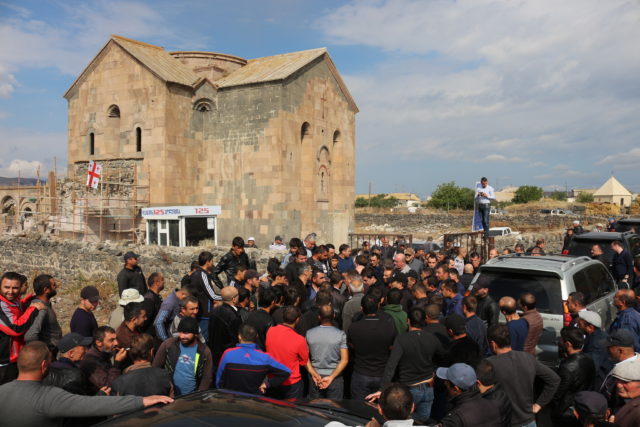
Who Provoked the Clashes Between Local Armenians and the Georgian Police?
Publication: Eurasia Daily Monitor Volume: 14 Issue: 129
By:

On September 30, Georgia’s minister of interior, Giorgi Mgebrishvili, urgently traveled to Samtskhe-Javakheti, a region on the country’s southern border. Most of the residents of this area are ethnic Armenians, though they hold Georgian citizenship (Jam-news.net, October 2). The minister flew by helicopter to the village of Kumurdo (Gumurdo, in Armenian), where the unique 10th century Resurrection Church is located. The purpose of Mgebrishvili’s trip was to calm Kumurdo’s population and stop the violence that began after local Armenians tried to break into the church yard to erect an “Armenian cross-stone” (khachkar) on the grounds (Imedinews.ge, September 30).
The town’s Armenians were protesting what they saw as hasty restoration work of the Resurrection Church, which is being carried out by the National Agency for the Protection of the Cultural Heritage of Georgia (NAPCHG). The residents of Kumurdo were convinced the Georgian restorers were disregarding the bodily remains of Armenians buried in the church yard. Therefore, they demanded permission to erect a khachkar at the grave site. Security around the church prevented them from entering the territory, but eventually the residents broke through the fence and stepped into the church courtyard. At that point, law enforcement stepped in with batons to try to disperse the crowd. In response, the protesters pelted the police cars with stones. Several people on both sides received minor injuries. The police detained several of the Armenians, but they were dismissed after Interior Minister Mgebrishvili successfully intervened and calmed the situation. Nonetheless, the Georgian Ministry of Internal Affairs initiated an investigation into the incident under charges of “hooliganism.”
A khachkar installed in the courtyard of the Kumurdo Resurrection Church would symbolize that this place of worship belongs to the local ethnic-Armenian community. But Georgian historians consider this church to be part of the cultural heritage of Georgia. Indeed, Georgians and Armenians have disputed each others’ claims to this historic church for a long time.
Gela Saitidze, a professor of the Institute of History and Ethnology at Tbilisi State University, told this author that he visited Kumurdo several times in the 1960s. And already then, ethnic-Armenian residents of the town were calling this church “Armenian.” “But there are a lot of Georgian inscriptions in the church, which confirm that the Kumurdo church is a legacy of Georgia, built in the era of Georgia’s unification under the rule of the Bagrationi dynasty,” Saitidze asserted “Some radical residents of the village do not want to listen to rational scientific arguments,” the academic declared. Furthermore, he stressed, that no serious Armenian historian has ever questioned that the Kumurdo church is Georgian and not Armenian. “By erecting a khachkar, the radicals [sic] want to assign [their own national symbols to] the Georgian church, and then turn it into a symbol [of Armenian identity],” Saitidze argued (Author’s interview, October 7).
After Interior Minister Mgebrishvili spoke to the crowd to calm the situation, the residents left the territory of the church and restoration work immediately resumed (Imedinews.ge, October 1). The following day, the Patriarchate of the Georgian Orthodox Church held a special meeting with the participation of representatives of Georgia’s Armenian Diocese. A joint statement was published on the website of the Armenian Diocese that states Armenia and the Armenian Apostolic Church have no claims on the Resurrection Church, in Kumurdo. The Georgian side, in the same statement, committed itself to take care of the Armenian individuals who had been laid to rest in the church’s courtyard (Armenianchurch.ge, October 3).
An employee of the NAPCMG, Beka Baramidze, said in an interview with this author that the agency “will firmly continue the course for the restoration of the [Resurrection Church],” adding, “This is our political position: the project for the restoration of the church will be brought to an end, but we will carefully study the proposals of scientists on the architecture of the dome of the church and we will not rush in this matter. It may take several more months to complete the work.” He agreed with the opinion that over the past 25 years, the work on the rehabilitation of this historic place of worship was hampered not only by scientific, but also by political problems—that is, the position of the local Armenian population (Author’s interview, October 7).
This month’s incident at the Kumurdo church marked the first time in the history of independent Georgia that open clashes broke out between Georgian police and the country’s ethnic-Armenian community. As such, the story provoked a vocal public response, including on online social networks and in the Georgian media. Experts have been debating the question of who was responsible for provoking the local Armenians to challenge the notion that the Kumurdo church is part of the cultural heritage of Georgia—and who might profit from such inter-ethnic and inter-religious discord.
The Samtskhe-Javakheti region borders on Armenia and Turkey. Former Georgian politician and Caucasus expert Mamuka Areshidze pointed out that only ten years ago, the regional capital of Akhalkalaki hosted a large Russian military base. “Many Armenians served on this base and in the contingent of Russian troops, including residents of the village of Kumurdo. The Russian command even established a special post—a deputy commander for working with the local population.” Areshidze noted that Russian special services actively recruited “agents of influence” among of the local Armenian population as well as distributed weapons to Armenians, which accumulated in large numbers in Kumurdo and other Armenian villages of the region. “Therefore, the village of Kumurdo is one of the most crime-ridden in the whole region,” Areshidze underscored (Author’s interview, October 7).
The Armenian government and the Armenian embassy in Georgia have not yet commented on the events in Kumurdo. This may indicate that Yerevan agrees with Tbilisi’s position on this issue. Moreover, Georgia and Armenia are interested in preserving good-neighborly relations.



